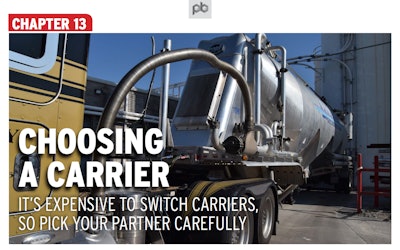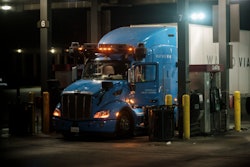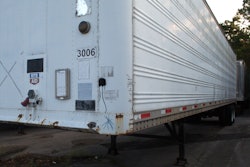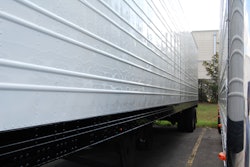I was talking to a fed-up driver. His company left him sitting all day waiting on a load, then finally dispatched him 670 miles with a delivery time the next morning.
To make matters worse, he would have to deal with Atlanta rush hour because he was dispatched so late. He was mad because he would not be paid for waiting, even though he was available for dispatch. He was fed up because his miles were consistently under 3,000 miles a week. He was fed up because the company treated him like a machine, a truck that could just be turned on and used whenever they were ready, left sitting idle when they did not need him.
We talked about other companies -- he was mad enough to seriously consider quitting.
We’re not in the good/bad old days, he intimated. Drivers aren’t going to just pop a pill, break out a new logbook, and make a run look right.
And it’s not just the waiting that’s at issue. His company sends him to cities without a pre-plan assist. With no option to sit at a receiver after unload and wait hours for the next load, all too frequently he must drive 20-50 miles to find parking. Empty miles, wasted time he’s likewise all too often not compensated for.
I could almost see him shaking his head while we talked. He sounded exhausted, physically and mentally.

He ran through numbers. His company has 260 drivers, give or take, each operator averaging three to four loads a week. 260 drivers moving 20 miles three times a week for parking: 15,600 miles a week, 62,400 miles a month. At 6 mpg, that’s 10,400 gallons burned. At $3.70 per gallon, he wagered, lack of pre-planning could easily cost the company more than $38K monthly.
Because he is a rookie driver, I noted that many companies have faced the same situations since the electronic logging device mandate’s implementation in late 2017. Add slow freight/excess capacity tamping down rates to so many fleets’ attitude toward drivers' value: changing companies might make little difference, I suggested, with a high likelihood of more of the same elsewhere.
[Related: The not-so-long haul: Operational challenges to owner-ops after the ELD mandate]
Again, I could almost see him shaking his head as we spoke.
It made sense to start exploring alternatives, he said, because the money he was taking home just did not justify being gone from that home as much as he was.
I guess I couldn’t disagree with him, and it got me thinking about value. If a carrier doesn’t value its own bottom line, how can we expect it to value the driver and their time?
There are varying dictionary definitions of value, but generally they share the common bond of worth -- the quality of something that is important, useful, fetching a high price, essential or beneficial, commanding praise.
Parsing value definitions, it dawned on me how much value is a reflection of our attitudes toward the thing valued. So many of drivers’ conflicts with carriers boil down to the company’s attitude -- toward them. Carriers that churn and burn through truckers, with high turnover rates? They betray a dime-a-dozen-type attitude to drivers. Without a wholesale company-culture shift, they’ll never value drivers as they should.
Clearly they need an attitude adjustment, which might be the bottom line for retaining the best out there.
It costs a boatload to bring in and train new CDL-equipped employees and/or independent contractor owner-operators leasing on. It costs the operator, too, of course. The “Choosing a Carrier” Chapter 13 in Overdrive’s Partners in Business handbook notes for leased owners that “the cost involved in making that switch often is overlooked,” particularly once we start considering all the downtime involved in searching for the new fleet, going through orientation and other interruptions to your routine. It can “be thousands of dollars” in the end.
 This year the Overdrive/ATBS Partners in Business owner-operator business education program is sponsored by Rush Truck Centers, the premier solutions provider to the commercial vehicle industry with 150-plus full-service dealership locations in the United States and Canada. The new PIB book is now available for download.
This year the Overdrive/ATBS Partners in Business owner-operator business education program is sponsored by Rush Truck Centers, the premier solutions provider to the commercial vehicle industry with 150-plus full-service dealership locations in the United States and Canada. The new PIB book is now available for download.
Yet the marketing rhetoric you hear from trucking companies is often enough just the opposite. Carriers advertise family atmospheres where drivers are not just a number. (I'm the black sheep, of sorts, and where I come from, family does not treat family in a positive way by default -- I’m naturally skeptical when I hear that.) Carriers boast about terminal amenities, their ability to get drivers home on the weekends, open-door policies, etc., etc. Granted, many have invested a great deal of money to offer drivers a comfortable place to wait when stuck away from home at the terminal and not getting paid.
You can have every little amenity in the world, yet I have never met a driver who’d rather stay at the terminal than home.
Home every weekend: Too commonly, it means the driver runs himself into the ground to get the miles they need for an adequate check and still get home, or they settle for a smaller paycheck to be home and rested enough to enjoy it. Other carriers will claim they have no problem getting drivers home every other week (something divorced fathers need), then hee-haw around when the time comes.
Part of the fix for these issues is that attitude adjustment I mentioned earlier, not just carriers’ attitude toward driver value, but also drivers’ attitude toward the value of their own time. Again, using the example of our rookie’s carrier above, if the carrier saved the money wasted on inefficiency and turnover and divided it between the drivers, each operator would bank a raise north of $3K annually.
Anyone can appreciate that sort of value.
Finally, the word value can of course refer to individual principles or standards. Let’s make it a principle among carriers that drivers are truly valued, and a standard that our own time is worth something. Wake up, drivers, and take a stand. The ball is not just in your hands. The ball is in your court. You own the court, fundamentally: trucking companies cannot exist without you.
[Related: Demanding detention improvement -- high time for action from all quarters of trucking]
 Find more information on ways owner-operators can evaluate carriers, from the pay package to the real dollars-and-cents value of time, in-depth in Chapter 13 of the Overdrive/ATBS-coproduced "Partners in Business" book for new and established owner-operators. The comprehensive guide to running a small trucking business is sponsored this year by Rush Truck Centers and available in an updated edition free of charge at this link.
Find more information on ways owner-operators can evaluate carriers, from the pay package to the real dollars-and-cents value of time, in-depth in Chapter 13 of the Overdrive/ATBS-coproduced "Partners in Business" book for new and established owner-operators. The comprehensive guide to running a small trucking business is sponsored this year by Rush Truck Centers and available in an updated edition free of charge at this link.










